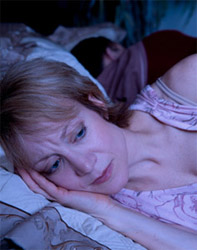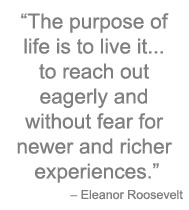Menopause Insomnia
Menopause insomnia is one of the pre menopause symptoms. Are you having problems sleeping?
It's no secret that sleep physically and mentally restores us. (affiliate link) After a good night's sleep, we wake up feeling great and are ready to face the day.
But, menopause sleep seems to be less than satisfying for the majority of women.
A study by the National Sleep Foundation found that 61% of menopausal women experience insomnia symptoms.
Typical Menopause Insomnia Pattern
For many women, falling asleep is the easy part - it's staying asleep that gets a little bit tricky.
We wake up a few hours into the night from either a noise (a partner's snoring, a barking dog, a passing car), a trip to the bathroom, or a hot flash, and then we can't get back to sleep.
Other women wake up far too early or can't even get to sleep in the first place.
So, why are we all tossing and turning and how can we find natural sleep? (affiliate link)
What's the Deal?
There are a few factors that play a role in your bad night's sleep.
- Life Issues: One of the main factors is emotional issues in your life. Anxiety about money, work, children, and spouses can keep our minds working and prevent us from relaxing enough to fall asleep.
- Hormones: As we all know, our hormones change greatly when we are in menopause. These changes in estrogen and progesterone can effect our breathing, our mood, our body temperature, and our ability to deal with stress. All of these factors can result in a poor night's sleep.
We have been experiencing changes in sleep due to shifting hormones for years. Even during our years of having predictable menstruation cycles, the fluctuation in our hormones affected our sleep.
Progesterone causes sleepiness, so when our levels of progesterone drop - both during menopause and during our earlier, regular, menstruation cycle, we experience nights that are not restful.
- Age: Scientists who study sleep patterns have found that older women spend less time in deep sleep and same time in REM phase.
- Night Sweats: Waking up in a pool of sweat can cause major obstacles to sleeping through the night.
- Diet: A poor diet (one that is high in refined carbohydrates) and caffeine intake can cause us to have poor sleeping patterns.
Menopause Insomnia Dangers

Aside from making you feel groggy, irritable, and less productive, menopause insomnia also increases your risk of developing high blood pressure, heart disease, stroke, obesity, depression, concentration problems, and relationship problems.
Yikes! That is one scary list, and a pretty good motivator to seek treatments for your menopause insomnia.
Menopause Sleep Treatments
We'll explore two types of treatment options to help you avoid menopause insomnia: supplements and lifestyle changes.
Supplements - Fight Menopause Insomnia
There are many types of sleep disorders that could be creating your menopause insomnia (apnea, restless legs syndrome, parasomnias...), so if you are experiencing one of these disorders (which your doctor can help you decide), know that there are prescription drugs that can help you out.
Here is a list of natural supplements that can give you an extra boost to help you get a restful night of sleep.
- MellowPause: (affiliate link) Not only does this natural product fight menopause insomnia, it also reduces your hot flashes and helps you to keep a balanced mood. What more could you ask for?
- Calcium-Magnesium: Take this supplement (calcium and magnesium are often produced in the same supplement) before you go to sleep. Along with helping you sleep, it will help to prevent osteoporosis.
- Melatonin: Your body produces this natural hormone, which regulates your sleeping and waking cycle. You can also take synthetic melatonin supplements to make sleep easier.
- Valerian Root: This root has a very bad taste, so I suggest taking it in pill form rather than using liquid extract.
- Amantilla and Babuna: A study showed that taking 15 drops of these 30 minutes before sleep helped over 80% of the participants sleep better.
- Kava: This member of pepper family is mainly sold as tea. Along with helping you sleep, it can reduce depression. But, don't use this if you take prescription drugs, drink alcohol frequently, or have liver problems.
- Chamomile: This popular sleepy herb is most commonly used in teas. It relaxes you and helps fix your tummy problems, but avoid taking it if you have asthma.
- Natural Progesterone Cream: Raise your progesterone level to increase your sleepy factor.
- Jujube: Taking this seed can reduces anxiety, fatigue, and irritablitiy, as well as help you sleep and relax.
- 5-HTP: This supplement is made from an African plant. Along with helping you sleep, it can help mild depression and suppress your appetite.
Lifestyle - Get Better Menopause Sleep
Making these lifestyle changes could make the difference between menopause insomnia and menopause sleep!
- Drop a Few Pounds: Extra fatty tissue in back of your throat can make it hard to breathe and cause you to have trouble sleeping.
- Limit Alcohol: Although drinking a glass of wine before bed may relax you for awhile, it can harm the second half of your sleep cycle.
Avoid alcohol altogether if you can, but if you can't, be sure to drink your last drink either before or with dinner. (Alcohol can also induce hot flashes - another great reason to avoid it!)
- Your Diet: Eating rich, spicy, sugary foods and foods that are high in refined carbohydrates can harm your sleep.
Consider changing to a high fiber diet.
Also, limit your caffeine intake. Even cola and chocolate can keep you awake.
Don't sleep on full stomach, but eating a snack before bed does not seem to be harmful. Just be sure that your snack is high in protein and low in refined carbohydrates. Fruit, cheese, and lean meat are all good snack options.
- A.M. Sex: If you are one of the lucky few who still has a sex drive, have sex in the morning. Many women find that rather than calming them, sex at this stage in life revs them up and makes it hard to sleep.
- Plan Your Work Out: Exercise is great for getting sleep, but don't work out close to bedtime. It can leave you stimulated and pumped up instead of sleepy and relaxed. Try to squeeze your workout into your morning if you can.
- Sunshine: Getting some sunshine everyday (about 15 minutes) not only helps your body to make melatonin (which encourages your body's natural rhythm), it also boosts your mood and helps you make vitamin D, which is great for the health of your teeth and bones.
- De-stress: Breathe. Breathe deeply.
Taking just 5 minutes to listen to relaxing music and focus on your breath can help you to feel more centered and relaxed.
Get rid of toxic stress by meditating, exercising, or using visualization/self imagery techniques.
- Aromatherapy: Get your sense of smell on your side! Some smells, like lavender, vanilla, and green apple, make you feel calm and relaxed.
Mix essential oils into your bath water, or put them on your neck and the insides of your wrists.
Drinking a hot mug of soy milk with natural vanilla flavoring before bed is also a great way to use aromatherapy to calm you before bedtime.
- Use the Bedroom Wisely: Your bedroom should have only two uses: sleep and sex. Don't watch tv or do work in your bedroom.
You want to send a very clear message to yourself: This room is for sleeping!
- Rituals: Following a pattern at night time can help your body realize that it is time to shut down and relax.
- Ready the Room: Make your room very dark. Turn off night lights and use dark blinds. Also, be sure that you are using comfortable sheets and bedding.
- Stop the Noise: You can't stop the neighbor's dog from barking, but you can stop yourself from hearing it.
Wear ear plugs to stop waking up from barking dogs, snoring spouses, and flushing toilets.
If you're not an ear plug person, use white noise like a fan, or listen to soothing music as you fall asleep.
Return to Menopause Treatments Page
Return from Menopause Insomnia to Estrogen Source Homepage.
Copyright © 2009- 2015 Estrogen Source. All Rights Reserved.
The information on this site is my opinion only.
Consult your doctor before acting on any information found here.
Click here to read our Privacy Policy and Disclaimer.



